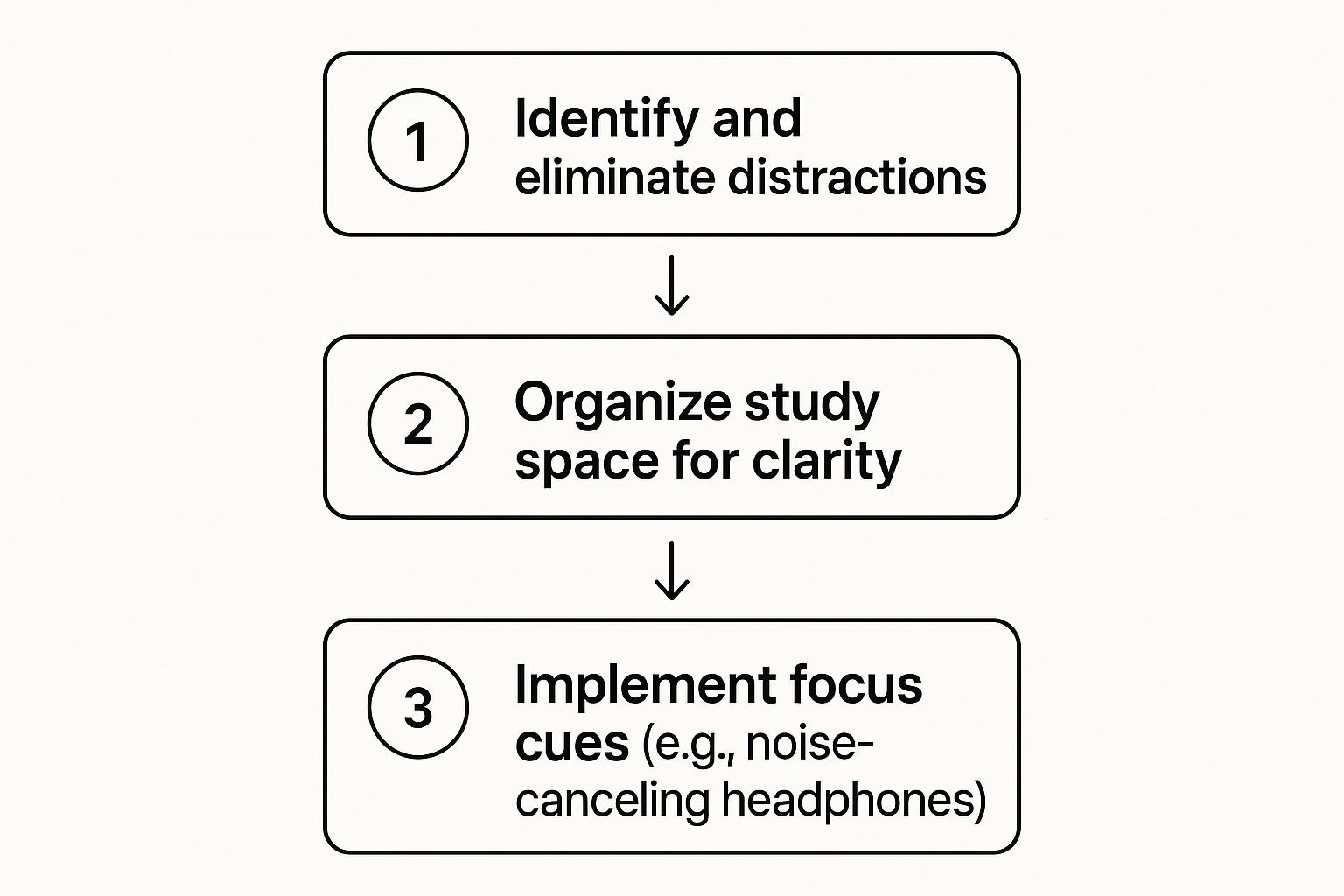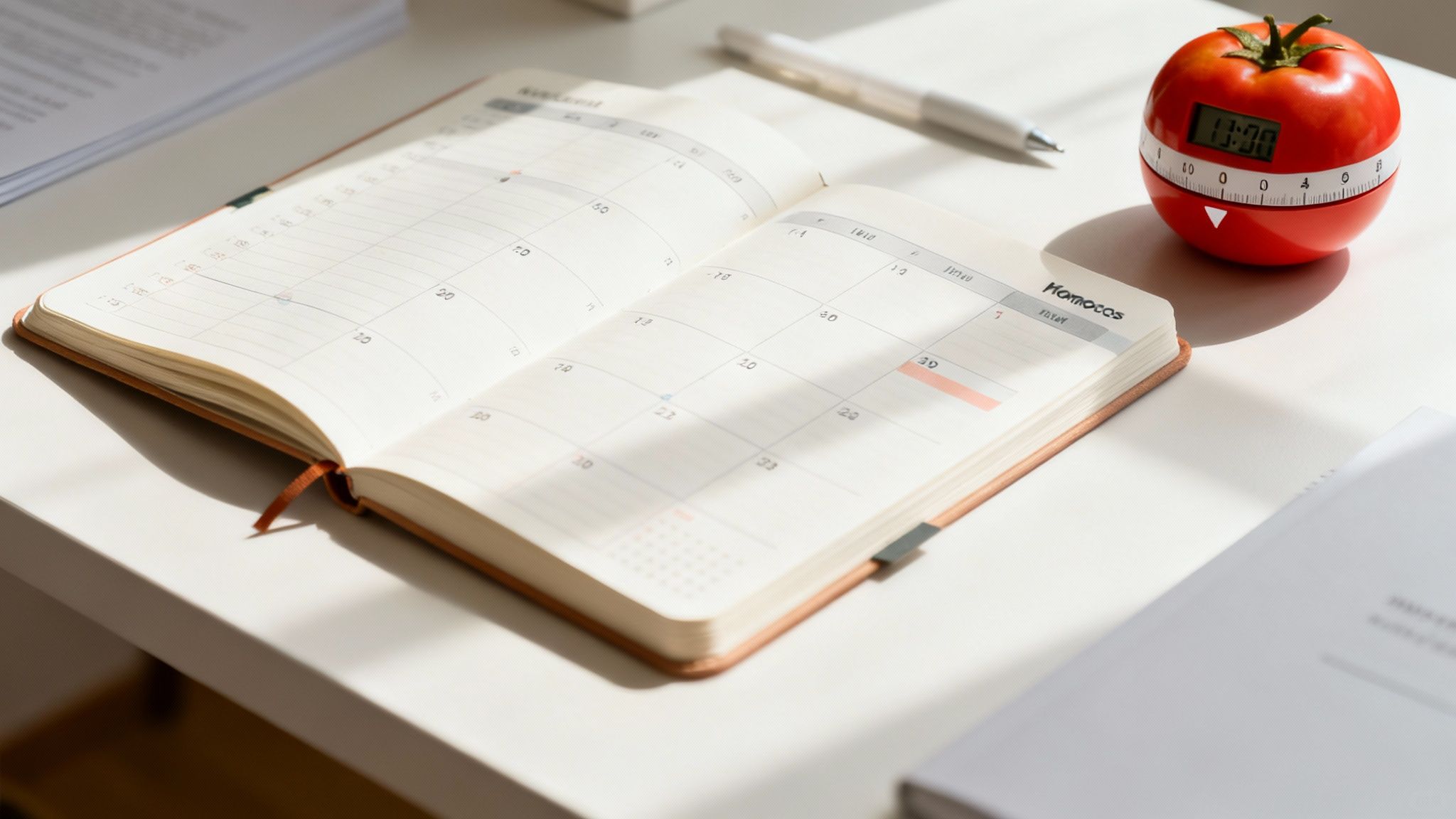How to Focus While Studying for Better Results
Figuring out how to focus while studying almost always starts with your physical surroundings. The goal is to build a distraction-proof environment that tells your brain it’s time for deep work.
When you do this right, concentration stops being a battle and starts becoming an automatic response.
Build a Distraction-Proof Study Environment
Your ability to concentrate is tied directly to what’s around you. A messy desk, a phone buzzing just out of sight, or even background noise can constantly splinter your attention. By deliberately engineering your study zone, you can systematically eliminate these interruptions.
This is about more than just finding a quiet corner. It’s about creating a dedicated, organized, and psychologically primed space for learning. When your brain learns to associate a specific spot only with studying, it flips into "work mode" a whole lot faster.
Eliminate Digital and Physical Distractions
Let's be honest: the biggest threat to deep focus is probably in your pocket right now.
A 2020 study found that students can waste up to 30% of their study time distracted by their phones and social media notifications. That’s a massive hit to your learning efficiency. To fight back, start with one simple, powerful move: put your phone in another room. Or, at the very least, turn it completely off.
On your computer, it's time to get serious. Use a website blocker like Freedom or Cold Turkey to lock yourself out of social media, YouTube, or whatever your digital kryptonite is during your study blocks.
Physically, a clean desk really does promote a clear mind. Get rid of anything that isn't essential for the task at hand—old coffee mugs, random papers, unrelated books. A minimalist setup cuts down on the visual noise and helps keep your attention exactly where it needs to be.
"Your external environment is a mirror of your internal state. A calm, organized space fosters a calm, organized mind. Take five minutes before each session to reset your desk; it's a small investment with a huge return on focus."
Before you start a study session, it's worth taking a quick inventory of your digital landscape. Here’s a simple audit to help you identify the usual suspects and implement quick fixes.
Digital Distraction Audit and Solutions
| Distraction Source | Impact on Focus | Actionable Solution |
|---|---|---|
| Smartphone Notifications | Constant, high-frequency interruptions that break deep thought. | Turn off all non-essential notifications. Better yet, put the phone in another room or on "Do Not Disturb" mode. |
| Social Media Feeds | Creates a powerful dopamine loop, making study material seem boring. | Use a website/app blocker like Freedom during scheduled study hours. Log out of all accounts. |
| Email/Messaging Apps | Triggers a sense of urgency and pulls you into reactive, shallow work. | Close all communication tabs and apps. Check them only during planned breaks. |
| Random Web Browsing | Leads down rabbit holes of unrelated information, wasting significant time. | Keep a "curiosity list" on a piece of paper. If a random thought pops up, jot it down to look up later. |
By proactively managing these digital drains, you reclaim control over your attention span instead of letting algorithms dictate it.
Engineer Your Personal Focus Bubble
Once you've cleared out the obvious distractions, the next move is to create a space that actively supports concentration. This is your "focus bubble"—a personal zone shielded from the outside world.
The infographic below gives you a straightforward, three-step process for building your ideal study spot.

This process shows that building a focused space is about proactive design, not just cleaning up. By spotting your personal distractions, organizing your desk, and using tools like noise-canceling headphones, you create layers of protection for your attention.
Even small environmental cues can signal the start of a deep work session. For example, some people use a specific lamp or play a particular ambient sound playlist only when they study. These little rituals help train your brain to snap into concentration mode on command.
And if you're looking for another tool to add to your toolkit, you might want to learn what Focus Pouches are and how they offer a smarter, healthier way to boost your brainpower.
Develop a Powerful and Consistent Study Routine
Let's be real: trying to study only when you feel motivated is a recipe for disaster. Motivation comes and goes. The real key to learning how to focus while studying is building a system—a routine so solid it practically runs on autopilot.
A good routine takes the decision-making out of it. You're no longer wasting mental energy debating if you should study. Instead, it becomes a non-negotiable appointment you have with your goals. The massive, intimidating task of "studying" breaks down into small, automatic steps.

Lock In With Proven Time Management Techniques
To make a routine actually stick, you need the right tools. Two of the best are time blocking and the Pomodoro Technique. They work hand-in-hand to give your study sessions structure, helping you get more done without burning out.
Time blocking is dead simple: you schedule your study sessions into your calendar like they’re important meetings. No more vague goals like "study chemistry this week." Instead, you block off Tuesday from 6 PM to 8 PM specifically to nail chapter five. This creates a real commitment and protects that time from other distractions.
Then, inside that time block, you use the Pomodoro Technique:
- Set a timer for 25 minutes and go all-in on one task. No distractions.
- Take a quick 5-minute break when the timer rings. Stand up, stretch, grab some water.
- Repeat this cycle four times.
- Take a longer, 15-30 minute break after the fourth round. You've earned it.
This rhythm keeps your brain fresh and makes it way easier to start. After all, anyone can commit to just 25 minutes of focused work.
A consistent routine trains your brain to anticipate and prepare for focused work. When you sit down at the same time each day, you're not just starting a task; you're activating a powerful cognitive habit that makes concentration feel more natural.
Set Crystal Clear Session Goals
A scheduled block of time is a great first step, but it’s 10x more powerful when you know exactly what you need to get done. Before you start, define one specific, measurable goal for that session.
This small shift changes everything. You’re no longer just "studying"—you're aiming for a tangible win.
So instead of a fuzzy plan like "work on the essay," a clear goal would be: "Write the complete outline for the history essay and find three primary sources." This gives you direction, focus, and a real sense of accomplishment when you check it off.
This isn’t just theory. A 2025 meta-analysis found a strong link between structured study habits and better academic performance. One study with 570 college students even confirmed that goal-setting was a major predictor of their success. You can dig into the full findings on effective study habits here.
Want to make your routine even more effective? Try integrating a nootropic like Dialed In Nootropics. Taking one of our Focus Pouches, available for purchase directly from our website, just before a study block can sharpen your attention and help you get locked in faster, making every single minute count.
Master Your Mindset for Deep Concentration
Knowing how to focus while studying is about more than just your physical environment; it's an internal game. Your mindset—how you handle stress, wrangle wandering thoughts, and mentally prep for a session—is the real engine behind deep concentration.
Anxiety and stress are notorious focus killers. It's a simple fact: when your mind is racing with worries, there’s no room left for complex information.
The McGraw Hill Global Education Insights Report 2025 even identified mental health struggles as a leading barrier to student engagement. This just confirms a critical truth: a calm mind is a focused mind. You can see the full report on how mental health impacts student focus worldwide for yourself.

Practice Mindful Attention
Look, your mind is going to wander. That’s a guarantee. The secret isn't stopping it from happening, but getting better at noticing when it happens and gently pulling your attention back. This is mindfulness in a nutshell.
Instead of getting frustrated when you catch yourself daydreaming about what's for dinner, just acknowledge the distraction without judgment. Label it—"thinking"—and then softly redirect your focus back to your notes. Every time you do this, you're basically doing a mental push-up, strengthening your concentration muscle.
Here’s a simple exercise to get started:
- Breathe: Before you crack open a book, take three deep, slow breaths. Focus only on the sensation of air moving in and out.
- Acknowledge: When your mind inevitably drifts during your session, just make a mental note of it. No big deal.
- Return: Gently guide your focus back to the task. No self-criticism allowed.
This practice builds the mental endurance you need to stay on track. If you're looking for an extra edge, check out our article on how to boost your energy and focus for studying.
"The goal of mindfulness isn't to empty your mind, but to become the calm observer of its activity. This skill allows you to manage internal distractions with the same effectiveness as you manage external ones."
Use Visualization and Positive Self-Talk
Your internal dialogue has a massive impact on your mental endurance. If you're telling yourself, "This is too hard," or "I'll never get this done," you're creating a self-fulfilling prophecy of failure and distraction.
So, reframe your thoughts. Before a tough study block, visualize yourself successfully completing the work. Actually imagine the feeling of finally understanding a complex topic or finishing a chapter. This mental rehearsal primes your brain for success.
Combine that visualization with some positive self-talk. Swap out the negative scripts for empowering ones:
- Instead of "I can't focus," try "I am building my focus one minute at a time."
- Instead of "This is impossible," try "I can figure this out step by step."
This isn't about ignoring difficulty; it's about building the resilience to push right through it. When you pair this kind of mental fortitude with a sharp cognitive state—supported by tools like our Dialed In Nootropics Focus Pouches, which you can buy directly on our website—you create an unstoppable combination for academic achievement.
Fuel Your Brain for Peak Academic Performance
Setting up your desk and getting into a routine are huge parts of the puzzle, but what you put into your body is just as critical for learning how to focus while studying. Your brain is a high-performance machine, and it needs premium fuel to operate at its best. Poor nutrition, dehydration, and a lack of sleep will absolutely sabotage your ability to concentrate.
Think of it this way: you wouldn't expect a car to win a race on low-quality gas, so why expect your brain to ace an exam when it's running on fumes? Prioritizing your body's needs isn't a distraction from your studies—it's the foundation they're built on.

Nutrition and Hydration for a Sharper Mind
What you eat directly impacts your brain function, memory, and concentration. Simple sugars and heavily processed foods are notorious for causing energy crashes and mental fog, making any kind of sustained focus feel impossible. Instead, you want to load up on brain-boosting foods.
Foods rich in omega-3 fatty acids, like salmon and walnuts, are vital for building healthy brain cells. At the same time, antioxidants found in blueberries, spinach, and even dark chocolate help protect your brain from stress. Even mild dehydration can mess with your cognitive function, so keep a water bottle on your desk and sip from it all day.
Here are a few smart food swaps to fuel your focus:
- Instead of a sugary cereal, go for oatmeal with berries and nuts.
- Instead of chips, grab a handful of almonds or an apple.
- Instead of a soda, drink a glass of water or unsweetened green tea.
These small changes give your brain the steady, reliable energy it needs to handle demanding academic work.
Supplement Your Focus for a Competitive Edge
A solid foundation of good nutrition and sleep is non-negotiable. But for students aiming for peak performance—especially during finals or intense projects—targeted supplementation can give you a serious advantage. This is where a well-formulated nootropic comes in.
Our Dialed In Nootropics are specifically designed to support the cognitive processes essential for effective learning. The formula is built on scientifically backed ingredients that work together to create a state of calm, clear-headed alertness.
By supporting neurotransmitter health and reducing mental fatigue, the right supplement can help you lock in faster and stay focused longer, making every study minute more productive.
For example, ingredients like L-Theanine, found naturally in green tea, promote a sense of relaxation without making you drowsy. This helps quiet the mental chatter that so often leads to distraction. Meanwhile, Bacopa Monnieri is an adaptogenic herb known for its memory-enhancing properties, making it easier to retain complex information.
This combination helps you get into a flow state where you're fully absorbed in your work, but without the jittery side effects of too much caffeine. If you're looking for ways to get that mental lift without the crash, our guide explores some powerful alternatives to caffeine for energy.
By pairing strong lifestyle habits—good food, proper hydration, and restful sleep—with the targeted support of Dialed In Nootropics, you create the optimal internal environment for academic success. Ready to give your brain the fuel it deserves? You can purchase Dialed In Nootropics directly from our website and experience the difference for yourself.
Integrate Dialed In Nootropics Into Your Regimen
You’ve already engineered a distraction-proof environment and built a solid routine. Awesome. Now it's time to add a catalyst that helps all those great habits work even harder for you.
Bringing Dialed In Nootropics into your study regimen isn’t about replacing what works; it’s about amplifying it. Think of it as upgrading your brain's operating system to run faster and more efficiently. It’s the final piece of the puzzle for learning how to focus while studying at an elite level.
Find Your Optimal Timing
Like any tool, the key to using Dialed In is timing. You want the cognitive benefits to peak right when you need to be completely locked in. Because our Focus Pouches, available for purchase on our site, are designed for fast absorption, they’re a quick and reliable way to get in the zone.
Here are a few scenarios where timing makes all the difference:
- Before a Long Library Session: Pop a pouch about 15-20 minutes before you open your books. This gives the active ingredients time to kick in right as you're settling down, helping you blow past that initial resistance and drop into a deep state of flow for hours.
- Right Before a Big Exam: Use a pouch as part of your pre-exam ritual. It’s perfect for calming last-minute nerves while sharpening your recall, ensuring you walk into the room feeling composed and ready to perform at your best.
- To Crush the Afternoon Slump: Instead of reaching for a sugary drink that guarantees a crash, a pouch provides a smooth lift in energy and clarity. It’s the ideal way to conquer that brutal post-lunch study block.
"I used to hit a wall around 3 PM every day, and my studying would just fall apart. With Dialed In, I can push through that slump without the jitters. It’s been a game-changer for my productivity, especially during finals week." - Alex R., University Student
Complement Your Established Strategies
Dialed In works best as part of a complete system—it’s a powerful enhancer for the focus-building techniques you’ve already put in place.
When your mind is clear and your neurotransmitters are supported, it becomes way easier to ignore your phone and stick to your Pomodoro timer. You’ve already done the hard work of creating a focused environment; our nootropics simply help your brain take full advantage of it.
While a lot of students just chug coffee, our formula offers a much more targeted solution. To really get into the science, check out our guide on why nootropics are better than caffeine for student focus.
This creates a powerful feedback loop. Your solid routine makes the nootropics more effective, and the nootropics make it easier to maintain your routine.
Ready to feel the difference? Grab your Dialed In Nootropics directly from our website and take your academic performance to the next level.
A Few Common Questions About Locking In Your Focus
Even with a solid game plan, you're bound to run into a few specific roadblocks when trying to study. Let's tackle some of the most common questions and give you real-world answers to keep you on track.
Fine-tuning your approach is what separates a frustrating study session from a productive one.
How Long Can I Realistically Study Without a Break?
This is a big one, but the answer is simpler than you think: stop studying when you feel your brain starting to glaze over. Forcing it never works.
Most research points to the brain being able to hold high-level concentration for about 90 minutes before things start going downhill. But you don't need to hit that number right away.
The Pomodoro Technique is popular for a reason—it’s built around 25-minute sprints of intense focus, followed by a quick 5-minute breather. This rhythm works with your brain's natural attention span, not against it, preventing that all-too-familiar burnout. Start small and build up your mental stamina over time.
Is Music Actually Helping, or Is It Just Noise?
It can definitely help, but the type of music is everything. The biggest mistake students make is putting on music with lyrics. Your brain can't help but try to process the words, which is just another distraction pulling you away from your textbook.
The goal is to find audio that drowns out distracting sounds without becoming a distraction itself.
Here are a few options that work well for most people:
- Instrumental Tracks: Think classical, ambient, or even instrumental electronic music. Anything that sets a mood without stealing the show.
- Lo-fi Playlists: These are literally designed to be calm, background-friendly audio wallpapers for your brain.
- Binaural Beats: Some people swear by these audio tracks for getting into a state of deep, uninterrupted concentration.
You'll need to experiment a bit to find the soundscape that works best for you.
What Do I Do When My Own Thoughts Are the Biggest Distraction?
Let’s be honest, internal distractions are often way worse than your roommate making noise in the other room. A simple but incredibly effective fix is the "thought parking lot."
Keep a notepad or a sticky note on your desk just for this.
The second a random thought pops into your head—Did I email that professor back? What am I making for dinner?—just scribble it down. The simple act of writing it down acknowledges the thought and gets it out of your head, so you can immediately get back to studying. You've "parked" it to deal with later, freeing up your mental bandwidth now.
This technique is basically mindfulness in action. It teaches you to notice your thoughts without letting them drag you down a rabbit hole. Mastering your internal environment is just as critical as organizing your physical one.
If you find that your racing thoughts are often a side effect of too much caffeine, you might want to check out our guide on how to stop caffeine jitters for better focus.
At Dialed In Nootropics, our entire mission is to help you hit your peak mental performance. Our Focus Pouches are engineered to give you that clean, sustained concentration you need to crush your studies and whatever else you're aiming for.
Purchase your Dialed In Nootropics today and get in the zone.

